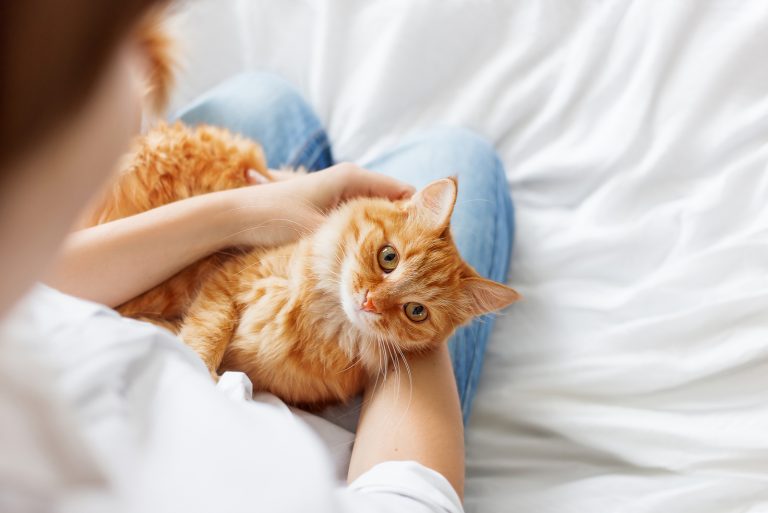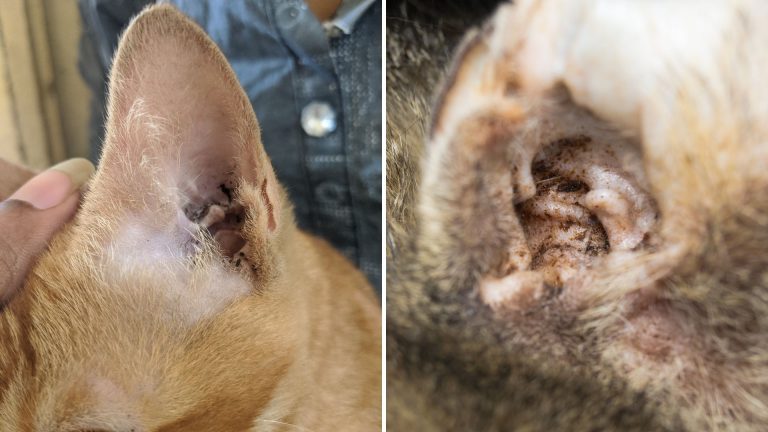At-Home Deworming For Cats: What You Should And Shouldn’t Use
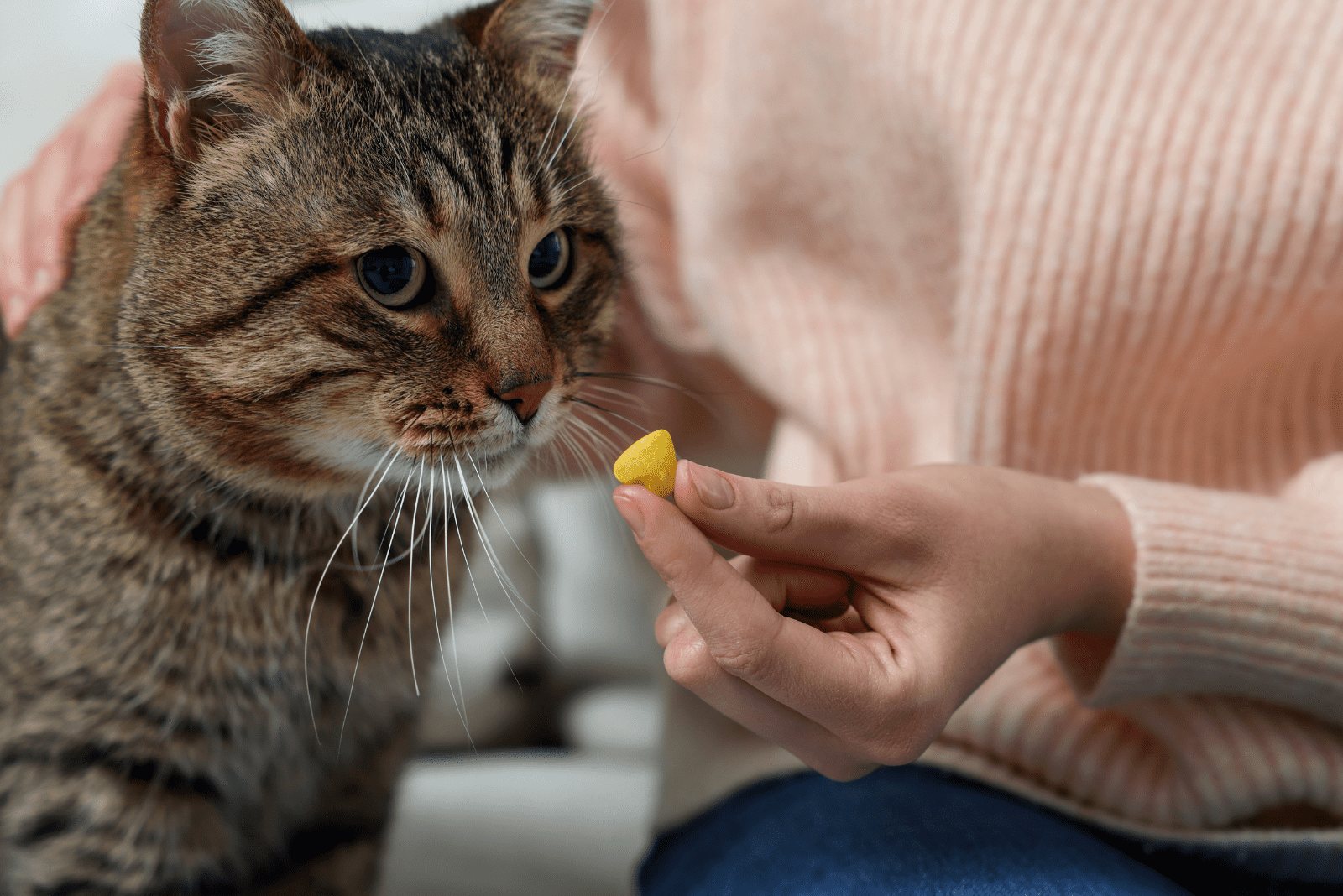
I know it’s not the most pleasant topic to talk about, but it’s an important one. Unfortunately, cats are prone to both external and internal parasite infestation. Although outdoor cats are more prone to developing worms, your indoor cats can become infected too.
If you know your cat is infected with worms but you are looking for a more natural approach to deworming your cat, cat owners – I have some good news for you!
There are some deworming options you might even find in your pantry! You can try various natural solutions including raw pumpkin seeds, food grade diatomaceous earth, chamomile, turmeric, carrots, dried coconut or coconut oil, and apple cider vinegar.
However, it has to be said that natural home deworming for cats does come with some risks and it is not always effective. Sometimes, medicine must be used in order to efficiently get rid of worms!
Keep reading to learn more about natural dewormers for your cat, how to do it safely, and what to do if they don’t work for your cat.
Home Deworming For Cats – 7 Natural Options To Try
Internal parasites are a persistent problem that many cats have to deal with, and some owners might opt for natural remedies in order to get rid of worms in their feline friend. Let’s explore some natural remedies you can try giving your cat!
1. Raw Pumpkin Seeds
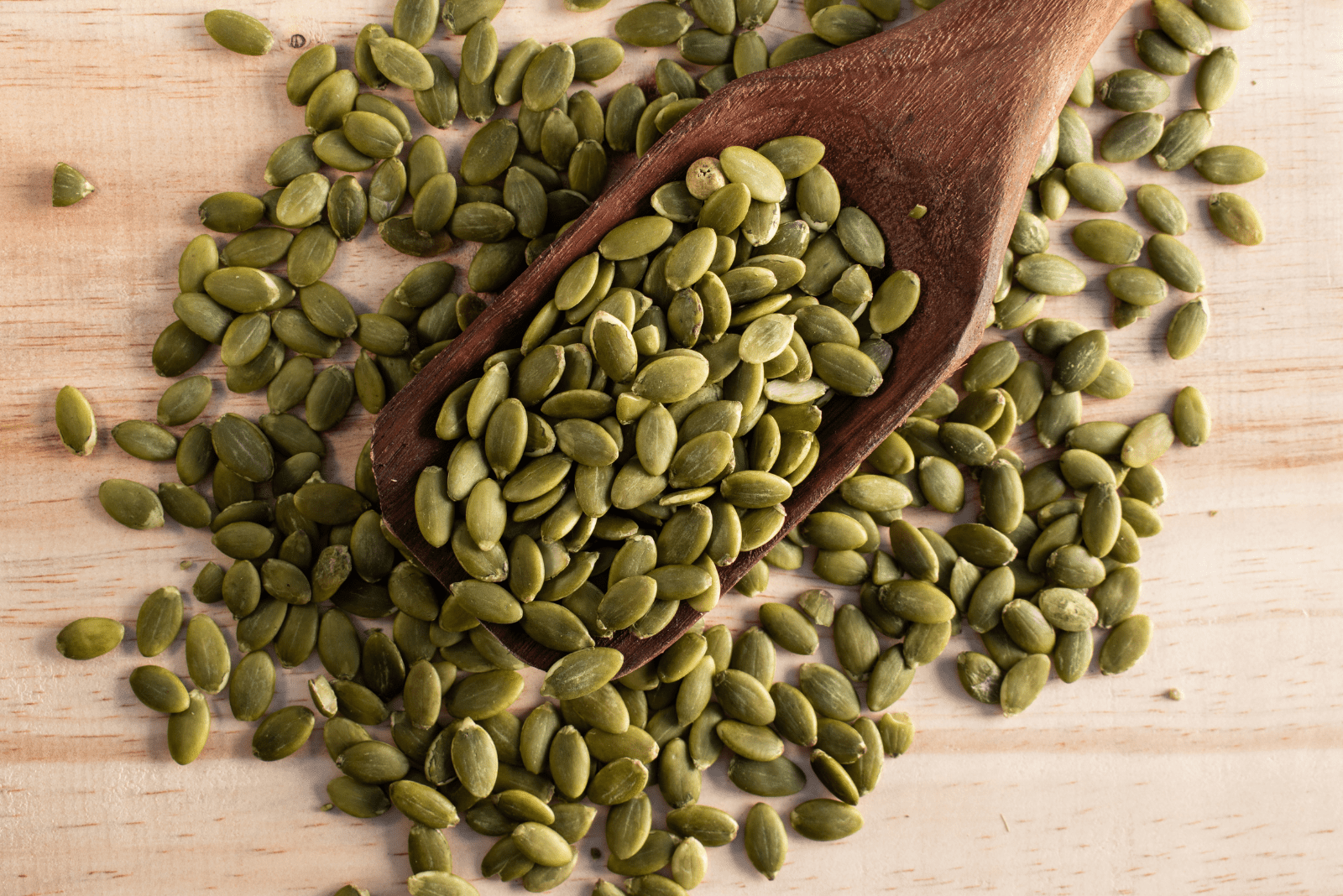
You might not be aware that raw pumpkin seeds offer many health benefits to cats. They are a great source of fiber, which is important for all cats, especially cats with sensitive stomachs. They’re also filled with protein, and protein is crucial for a healthy cat’s diet.
Raw pumpkin seeds can be used as a natural dewormer; you can give them to your cat by grinding the seeds and mixing some in with your cat’s food.
Pumpkin seeds contain an amino acid named cucurbitacin. It paralyzes leeching worms, causing them to release their hold on the intestinal walls of your pet so they can be eliminated from the intestines.
You should check your cat’s stool for worms while using pumpkin seeds as a worm treatment. You can expect to see worms for a few days after giving your cat this treatment, but then they should stop appearing.
2. Food Grade Diatomaceous Earth
Food grade diatomaceous earth is a highly-absorbent powder that humans use for many health-improving purposes, as well as being useful in the garden as an anti-pest treatment.
It is given as a dewormer by adding it to the cat’s food. This substance kills the worms via dehydration, due to its highly absorptive nature.
It’s recommended that you mix half a tablespoon of food grade diatomaceous earth with a can of wet cat food. As it comes in powder form and is tasteless, your cat should not be able to feel it or smell it in the food, so it should be relatively easy to get them to ingest it. Try it for a couple of days and see if your cat’s stool stops containing worms.
If your cat still has worms in its feces after a few days’ usage, don’t continue the treatment right away. You need to wait for two weeks before trying again. Another important note is that you need to specifically look for food grade diatomaceous earth, and not any other type of diatomaceous earth (such as filter-grade, which is toxic for cats).
3. Chamomile
Chamomile is known for the stress-relief properties it offers to humans and it also does the same for cats. Apart from its calming effects, it also has anti-parasitic properties. Did you know that chamomile is used to prevent and eliminate worms in cats?!
Chamomile is especially effective for roundworm treatment. Be careful not to give your cat too much chamomile (in the form of tea). A small dose of half a teaspoon is enough for an adult cat. Kittens can be given 1/3 of a teaspoon.
Some pet owners have noted that chamomile tea helps their cats with gastrointestinal problems and inflammation. Just keep an eye on your cat – some cats experience side effects associated with chamomile, such as vomiting and diarrhea.
4. Turmeric

Turmeric is a popular spice that many food-lovers enjoy, so you might find it in your kitchen already. Few people know about the health benefits it can offer to your feline friend. Aside from boosting your cat’s general health, it also helps fight off worms!
Turmeric can help in the prevention of worms, the elimination of worms and in healing any intestinal damage caused by the worms.
Turmeric also has anti-inflammatory, anti-oxidative, anti-bacterial, anti-fungal, and anti-viral properties that your cat can benefit from. It is also great for cats suffering from arthritis, heart disease, immune system issues, and even cancer!
5. Carrots
You might be surprised to learn that carrots can be helpful for getting rid of worms. It should be noted that carrots should not be used as the main weapon in your cat’s battle against worms. They will simply aid in worm-elimination and offer your cat many other helpful health benefits.
Carrots are rich in beta-carotene (a precursor of vitamin A), vitamins K & E, as well as minerals such as potassium, magnesium, phosphorus, and zinc. These nutrients will boost your cat’s immune system, aiding in the fight against parasites.
To prevent choking, be sure to cook carrots and cut them up into small, easily-digestible pieces before giving them to your cat.
6. Dried Coconut Or Coconut Oil
Coconut is a good source of protein for cats and some cat owners like giving dried coconut flakes to their cats as an occasional treat. Coconut also boosts a cat’s immune system and helps reduce hairballs.
Coconut also has anthelmintic properties, meaning it helps eliminate intestinal parasites. It’s recommended to mix a little bit of dried coconut (half a tablespoon) into a cat’s food and give it to them like that. Cats can naturally be dewormed using coconut oil as well. The lauric acid in coconut oil is changed by your cat’s body into monolaurin, which has actually been shown to be effective against tapeworm.
Make sure you regularly check your cat’s feces for worms and if you suspect this treatment is not working after several days, try another option or seek veterinary help.
7. Apple Cider Vinegar
Apple cider vinegar can have various health benefits, including helping your cat fight off a urinary tract infection or an upper respiratory infection. It also is used to repel fleas and mites if applied to a cat’s skin.
Apple cider vinegar can be used as an at-home dewormer for your cat. It slightly changes the pH of the cat’s intestines, making it unsuitable for worm development. Do note that apple cider vinegar should not be used as the main deworming agent; it’s not strong enough to completely eliminate worms but it can surely help in deworming.
Cats do not like the taste or smell of apple cider vinegar, so you’ll have to dilute it with water. Add 1/4 of a teaspoon into a cat’s water bowl. That should be diluted enough for your cat to either not notice, or at least not mind it so much.
Be Careful About This – Fasting As A Deworming Treatment

You might hear or read advice that fasting is a good option for deworming a cat. The principle is that you don’t give any food to your cat for a day, with the hopes that the cat’s internal parasites will die because of lack of nutrients. I am sure you’re wondering if cats can last a day without food?! Yes, cats definitely can last a day without food.
I personally don’t recommend this approach, but if you don’t want to give your cat prescribed medicine and have tried all natural at-home dewormers, you could try this option. If your cat is healthy, they will not have a lot of trouble getting through one day without food, but note that there aren’t any scientific studies that prove this treatment option actually works and is safe.
An Item You Need To Be Warned About – Garlic
You might also encounter advice that garlic is a good solution for deworming your cat. It most definitely is not! In fact, it’s well known that garlic is extremely toxic for cats! I’m sure we’re all aware of the health benefits garlic offers to humans, but this is not the case for cats.
Even one small clove of garlic can have lethal consequences for your feline friend, so please refrain from using it.
Before giving your cat anything you’re not sure about, please research the suitability of the substance from trusted sources or speak to your vet. That is the only way to ensure your cat’s safety!
What Exactly Are Worms And How Do Cats Get Them?
Worms are intestinal parasites that can infest both indoor and outdoor cats. The severity of the infection and subsequent treatment depends on the type of worm and the cat’s age and general health.
What Are The Most Common Types Of Worms To Infect Cats?
There are many different types of worms that can infect cats, including those that target a cat’s intestines, heart, lungs, bladder, or liver. By far the most common worms are those that infect a cat’s intestines.
The most common intestinal worms to infect cats are hookworms, roundworms, tapeworms, and whipworms. When it comes to worms that infect the heart, there is one well-known worm – the heartworm. Although this infection is very rare (it’s more common in dogs), it’s very notorious, and so it is worth discussing this type of worm too.
Tapeworms
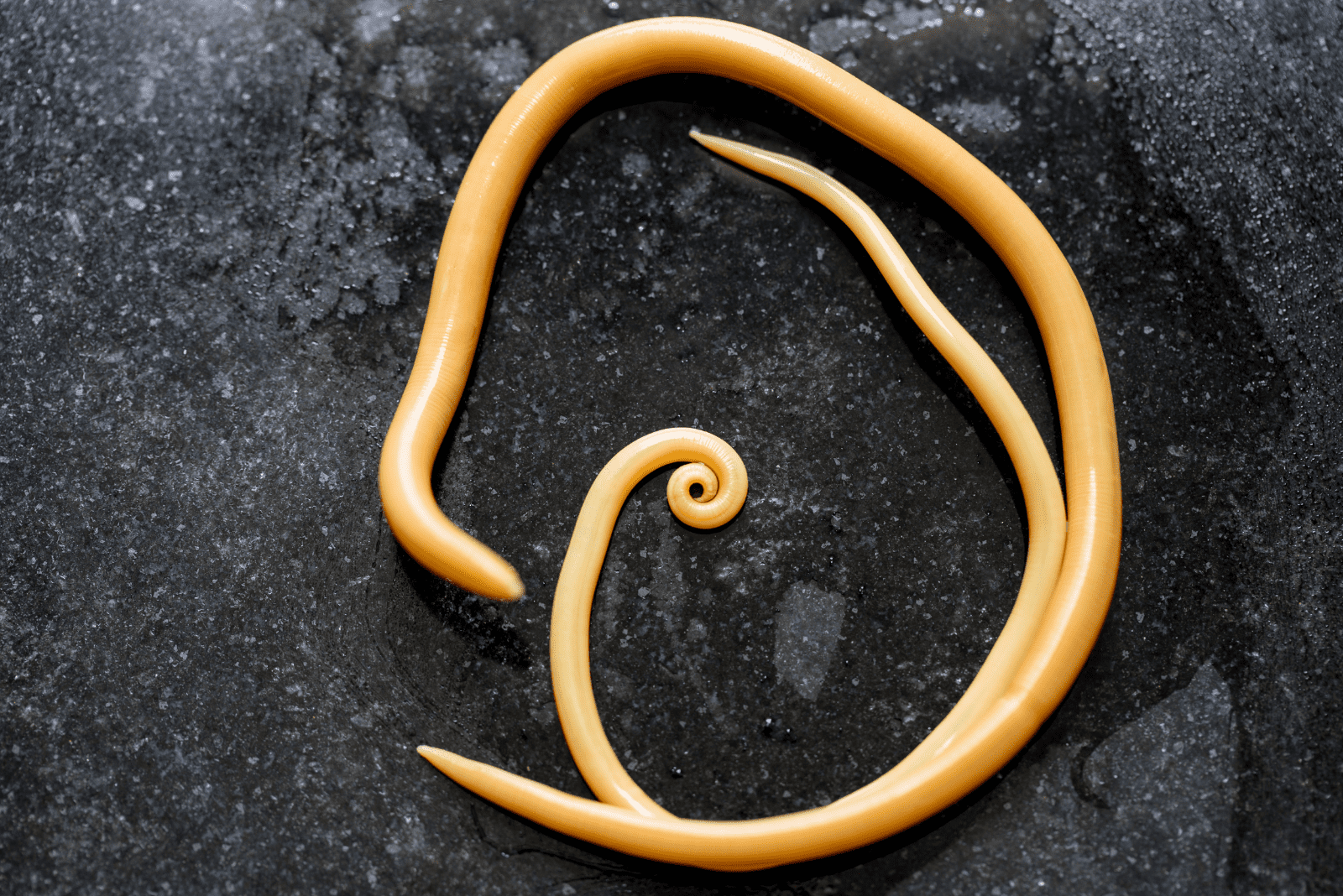
Tapeworms are by-far the most common type of worm in adult cats. How do cat owners recognize them? Well, if your cat has “grains of rice” or “sesame seeds” around or in their rear end – it’s actually tapeworms. Yes, I know it sounds disgusting, but it’s important to know how to recognize them.
So, how do cats even get infected with this parasite? Usually, this happens when a cat grooms their fur. Fleas that are infected with tapeworm larvae end up on the cat’s fur and subsequently in their gut. Then, these “baby tapeworms” grow inside a cat’s intestines.
Roundworms
Roundworms on the other hand, end up in a cat’s intestines when a cat ingests roundworm larvae or eggs. This can happen during nursing (when roundworm larvae are present in a cat’s mammary glands) or via the ingestion of something that contains roundworm eggs.
Roundworms are quite common in the cat world and almost every cat will get infected with them at some point in their life. Young adult cats are very resilient when it comes to this parasite, but kittens and older cats aren’t; for them, a roundworm infection can be deadly.
Hookworms
Hookworms are intestinal worms that are especially dangerous for kittens and young cats. Hookworms feed on blood and can cause internal blood loss. So, how do hookworms end up in the cat’s intestines? Well, hookworms live in soil so if your cat walks on hookworm-infected soil, it is possible for them to get onto your cat’s fur and feet.
When a cat grooms itself, these worms are ingested by the cat. When hookworms find themselves in the cat’s intestines, they release eggs and these are subsequently released into the environment through your cat’s feces. Therefore, it’s also possible for a cat to be infected with hookworms through contact with infected dogs and cats’ feces.
Whipworms
This type of worm is the least common of the various intestinal worms, but it’s still possible for it to infect your cat. So, how does a cat get infected with whipworms? Cats usually get infected with them by ingesting food, water, or feces contaminated with these worms.
Cats of all ages are prone to developing this parasite in their intestines. This is a dangerous infection that takes months to develop, but when the symptoms show, they tend to be very serious. Luckily, whipworm infestation is relatively rare in cats.
Heartworm
Cats are infected by a heartworm via a bite from an infected mosquito. Luckily, not all cats bitten by an infected mosquito develop heartworm disease as a result.
Cats are actually very resistant to heartworm infection, and they rarely develop heartworm-associated disease. This is because cats are not the best hosts for this worm (luckily!). However, when the disease does develop, it’s life-threatening and it usually needs to be resolved via a surgery.
Benefits And Risks Of Deworming Your Cat Naturally
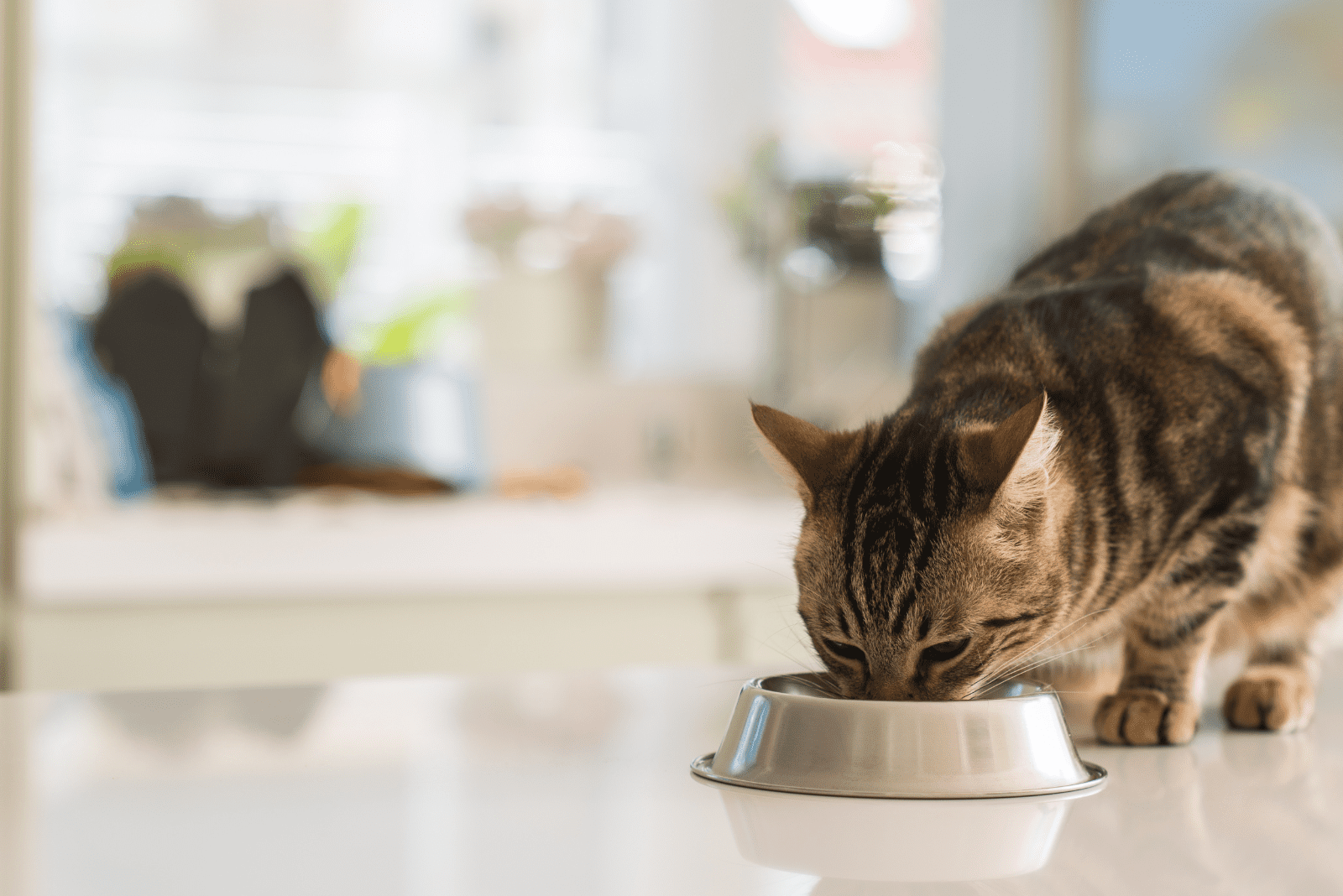
At-home deworming for cats, as with any other treatment option, comes with certain risks and benefits.
The Benefits
The Benefit of using at-home de-wormers is that you know exactly what you’re giving your cat. When giving them drugs, you don’t really know how they may affect your cat. This is extremely important for cats with sensitive stomachs and cats that are on other medication.
Cats with sensitive stomachs can have trouble taking cat deworming drugs, so natural options may suit them better. For cats that take other drugs as well (unrelated to their worm issues) there may be interactions to consider.
Mixing drugs is never good and can potentially be dangerous. Some medicinal drugs don’t react well with one another, which is a risk if your cat is taking different types of drugs.
The Risks
I know every cat owner simply wants their cat’s worms to be gone, but it’s important to do it safely and efficiently. There is always an option of natural de-wormers not working, and that’s a serious issue for a cat’s health. Considering that a cat’s wellness is the number one priority, knowing when to stop using natural at-home de-wormers is key. If you observe your cat still has worms after you have attempted treatment, please visit the vet. Your pet’s health might depend on using prescribed deworming medicine.
My Cat Is Not Responding To At-Home De-Wormers – What Should I Do?
There is a chance your cat will not respond to natural de-wormers. This can happen if your cat’s infection is more advanced than at-home de-wormers can battle with. In these cases, deworming medicine is absolutely essential in order to get rid of these parasites efficiently.
Cats that are infected with a more harmful type of worm or when infection is very advanced (worms have multiplied and are now present in large numbers) will need strong medicine, therefore at-home natural deworming is most likely not going to work for them.
If you observe that your cat is not responding to at-home de-wormers, you need to take your cat to the vet as soon as you can.
Worm infestation can be life-threatening, so having a vet examine your cat is the best option. They will definitely know which type of worm your cat is dealing with, how advanced the infection is, and how to successfully treat it.
De-wormers (or sometimes called wormers) are drugs given to a cat in tablet or liquid form. When you start a deworming medicine, you will most likely observe worms in your cat’s stool for a couple of days because your cat’s body is getting rid of the parasites by pooping them out!.
Make sure to follow your vet’s guidance and always give the medicine to your cat as prescribed.
At The End Of The Day – Prevention Is Better Than Cure
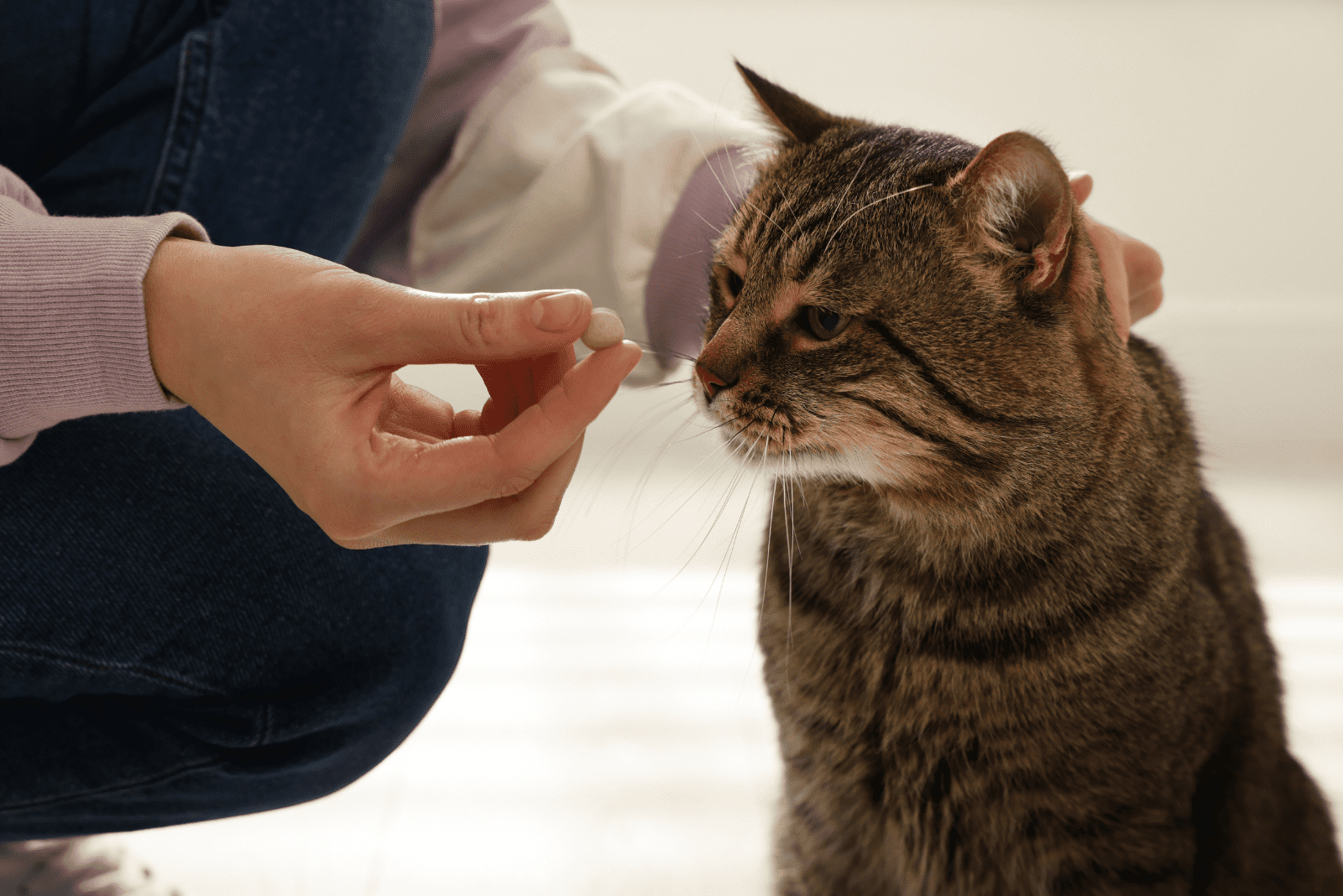
As we all know, it’s better to prevent an infection rather than treat it. So, how do you prevent your cat from getting a worm infection?
The best way to prevent a worm infection is to give your cat preventative medication. It’s recommended that you regularly give your cat flea prevention and worm prevention drugs.
Deworming is recommended every two weeks starting at six weeks of age and continuing until they’re 3 months old. After this, worm meds can be taken several times a year, or monthly (as is usually recommended).
These drugs come in various forms, such as spot-on, liquids, or tablets. Some of these preventative medications manage different types of parasites, such as worms, fleas, mites, and ticks.
It’s also important to keep the litter box clean at all times, especially if multiple cats are sharing a litter box. This way, you can prevent a healthy cat from becoming infected by parasites from the infected cat’s stool.
It is known that indoor cats are at less risk of parasitic infections compared to indoor cats. Because of this, some pet owners might want to have a relatively risk-free life for their cat and decide to keep their cat exclusively indoors.
Regular veterinary check-ups can catch any potential worm infection in its early stages, which increases your cat’s chances of efficiently getting rid of the parasites.
Final Thoughts
Unfortunately, cats are prone to developing both external and internal parasitic infections and worms are one of them.
There are many different types of worms that can infest cats; they may be found in a cat’s intestines, bladder, liver, lungs, or even heart. But by far, the most common ones are the intestinal worms; namely hookworms, roundworms, tapeworms, and whipworms.
Symptoms of worm infestation include vomiting, diarrhea, weight loss, weakness, pale gums (due to anemia), and in the most severe cases – death. Luckily, with a correct diagnosis and proper treatment, feline worms can be successfully treated! When dealing with worm infection, the key is noticing the symptoms early and treating it as soon as you notice them.
You can deworm your cat using either natural home de-wormers such as raw pumpkin seeds, food grade diatomaceous earth, chamomile, turmeric, carrots, dried coconut or coconut oil, and apple cider vinegar. Make sure to give your cat the right dosage and inspect your cat’s poop for signs of (no) worms.
It’s important to note that natural de-wormers are not as powerful as the medicinal de-wormers your vet can prescribe you. Therefore, if you see the natural de-wormers are not working, please visit a vet. It’s possible that your cat has a more serious case of worm infestation, which can be a huge health risk.
There you have it – now you know everything there is to know about at-home deworming for cats. I hope you learned something new and if you are dealing with a worm infestation, don’t worry – your cat will be perfectly healthy and well in no time!


